1. The Workaholic Who Never Quit
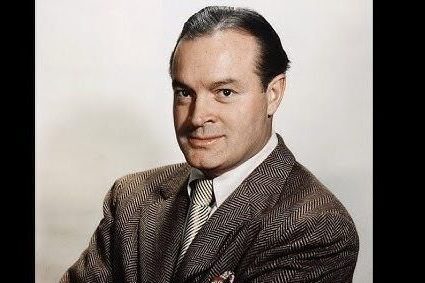
Bob Hope’s career wasn’t just long, it was relentless. Spanning across eight decades, he appeared in over 70 films, hosted countless television specials, and performed thousands of live shows. His genius lay in his ability to master every emerging medium, seamlessly transitioning from vaudeville to radio, film, and finally to television, ensuring he was one of the most enduring entertainers of the 20th century. This incredible work ethic, however, was fueled by more than just passion; it was driven by an underlying insecurity. Hope seemed terrified of letting the spotlight drift away, prompting him to keep working, constantly updating his acts and chasing new appearances well into his nineties. While his longevity was astonishing, this refusal to slow down led to complaints that his material grew stale, formulaic, and repetitive in his later years. For Hope, slowing down meant fading away, and he chose constant work over a graceful retirement.
2. Cozy with the White House
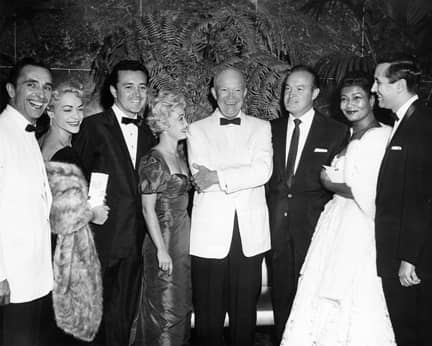
Hope enjoyed an almost unprecedented connection to the American political elite, fostering close friendships with every sitting U.S. President from Dwight D. Eisenhower to Bill Clinton. This bipartisan charm granted him extraordinary access, often finding him sharing a round of golf with the nation’s leader or performing at the White House. This strategic proximity to power was invaluable to his brand; his appearances alongside presidents not only reinforced his patriotic image but also cloaked him in an aura of institutional importance. For Hope, being seen with the most powerful men in the world was a way of lending weight and gravitas to his status as America’s comic. However, this coziness didn’t escape scrutiny. Some critics suggested that his fervent, public patriotism functioned less as a genuine expression of political principle and more as a career strategy, a shield that helped maintain his popularity and deflected attention from his private life. Ultimately, these relationships sustained his influence and kept him relevant long after his peak in film and radio had passed.
3. Holiday Tradition, Business Strategy
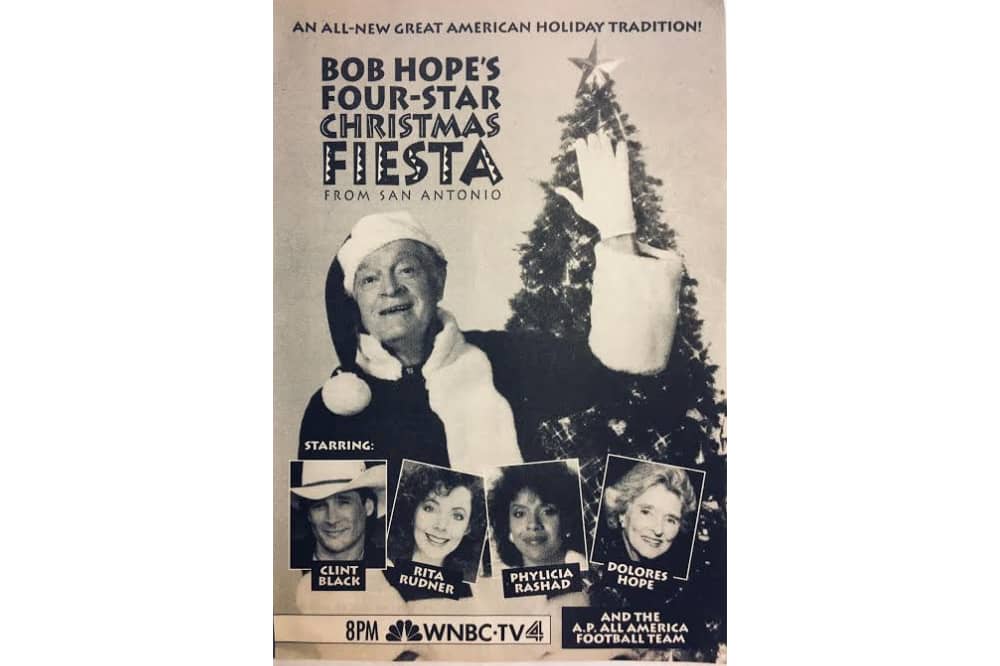
The Bob Hope specials on NBC, particularly the annual Christmas broadcasts, became television institutions. For many American families, tuning in was as essential to the holiday ritual as carols and tree-trimming. These shows were the perfect vehicle for Hope, seamlessly blending his trademark clean comedy with lavish musical numbers and dozens of celebrity cameos. They served to cement his image as the wholesome, patriotic voice of America, guaranteeing him unparalleled access to American living rooms even as his film career waned. What audiences saw as spontaneous holiday cheer, however, was in reality a meticulously crafted piece of brand management. Behind the scenes, Hope was known to be intensely controlling, overseeing every joke, musical cue, and camera angle to ensure his public persona remained flawless and intact. These specials weren’t just entertainment; they were highly curated instruments designed to sustain the Bob Hope enterprise.
4. Obsession with Relevance
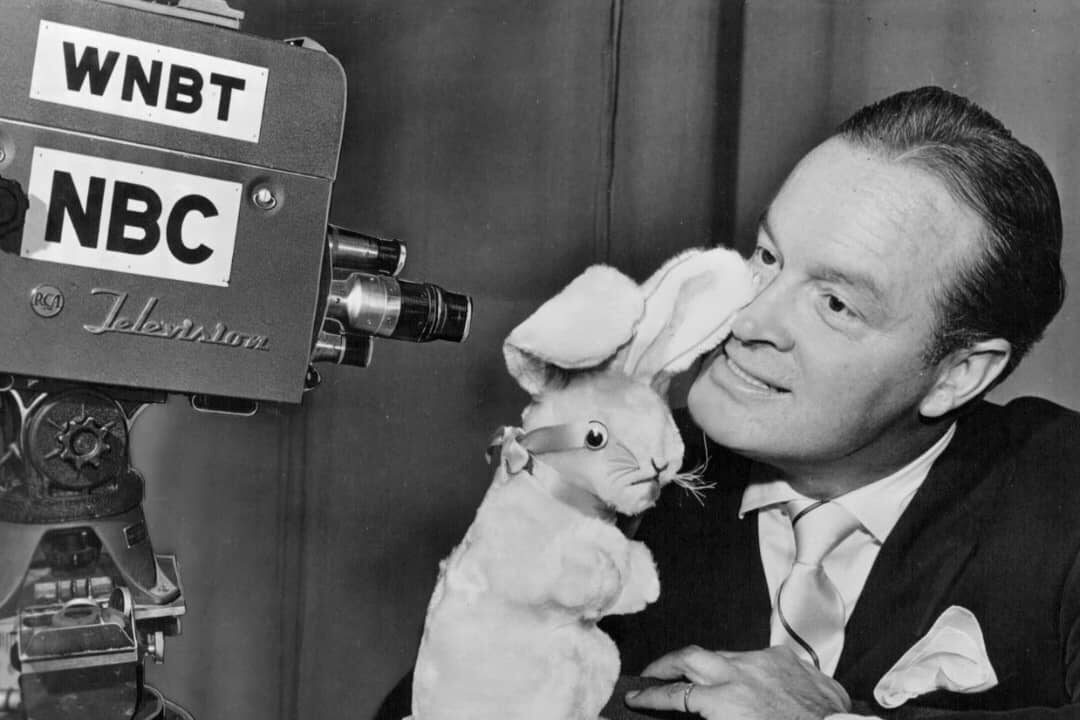
Hope’s decades-long pursuit of fame wasn’t merely ambition; it was a deeply ingrained vanity that bordered on obsession. He was chronically worried about his relevance in the changing entertainment landscape, constantly updating his joke files, seeking TV appearances, and finding ways to insert himself into the national conversation. This determination was the key to his extraordinary longevity, keeping him famous for seven decades. Yet, this relentless drive came at a cost: critics often accused him of recycling material and stubbornly overstaying his welcome in an industry eager for new faces. Hope’s greatest performance wasn’t on stage or screen; it was his unwavering refusal to let the public forget him. This insecurity, the absolute terror of being forgotten, underscored the fragility beneath the grinning, confident facade, revealing that the need for fame was the true motivation behind much of his late-career work.
5. The Comic Masked a Mogul
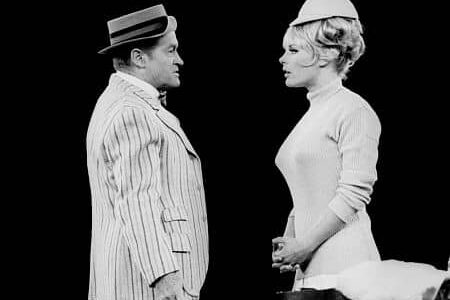
The public knew Bob Hope as the easygoing, spontaneous comic, but that genial demeanor masked a demanding and controlling personality. In Hollywood circles, he was renowned as a shrewd, exacting businessman who managed his image with an iron fist. From negotiating studio deals to personally reviewing every joke and photograph released to the press, Hope choreographed nearly every aspect of his professional life. Colleagues recalled that he was quick to exert his power, making the distinction between the amiable comedian and the calculating mogul quite stark. His need to maintain absolute control over his brand and career suggests not only immense ambition but also a deep-seated insecurity. The meticulously organized nature of his off-stage life was in direct contrast to the appearance of effortless spontaneity he projected to his audiences, highlighting the calculated effort required to uphold the wholesome Bob Hope myth.
6. The Womanizer Whisper
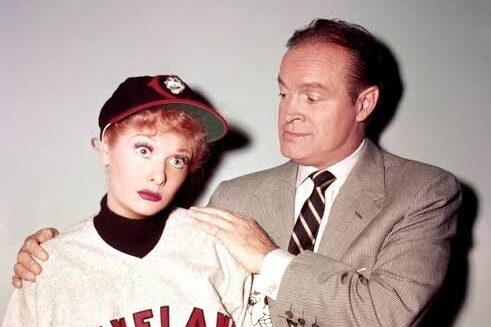
For decades, the gossip about Bob Hope’s relentless womanizing remained an “open secret” within the entertainment industry, while the public remained largely unaware. The power dynamic of the era, coupled with the influence of the studio system and a protective press, ensured that his numerous affairs were consistently suppressed or “smoothed over” by publicists. While he was hailed as a symbol of American decency, young female performers and chorus girls in his orbit often knew a different reality. Hope’s ability to maintain his meticulously crafted, family-friendly image despite his true reputation was a testament both to his personal charisma and the complicity of the Hollywood machine in the mid-20th century. This duality, the comic icon and the private playboy, makes him one of the most compelling and conflicted figures in show business history.
7. Patriotism as a Carefully Crafted Shield

Hope’s patriotism was undoubtedly sincere, yet it was also undeniably the cornerstone of his meticulously packaged brand. His USO tours, his presidential friendships, and the ubiquitous flag-waving in his routines ensured he became synonymous with the idea of America itself. This brand alignment sustained his career through decades of cultural shifts and changing tastes, guaranteeing him audience approval. Critically, this powerful image of the “comic patriot” also served as an almost impenetrable shield. By embodying the nation’s ideals, Hope successfully deflected public attention away from his significant personal flaws, including his infidelities and vanity. He understood that by making his devotion to country his most recognizable trait, he could remain universally beloved regardless of the contradictions in his private life, turning his genuine affection for the military into a savvy marketing tool.
8. Hope the Real Estate Mogul

Beyond his fame as a comic, Bob Hope was an exceptionally shrewd businessman and investor. Few fans realized that the true foundation of his enormous wealth came not just from punchlines and performances, but from massive investments in California real estate. Over the decades, he amassed vast holdings, becoming one of the wealthiest entertainers of his time. This calculating financial mind was in stark contrast to the easygoing, slightly scatterbrained persona he played on stage. The genial comic mask concealed a relentless financial strategist who possessed instincts sharper than many Wall Street professionals. This hidden side reveals Hope as a calculating mogul who understood how to leverage his fame for profit, adding an unexpected layer of commercial complexity to his beloved image.
9. The Enduring Contradiction
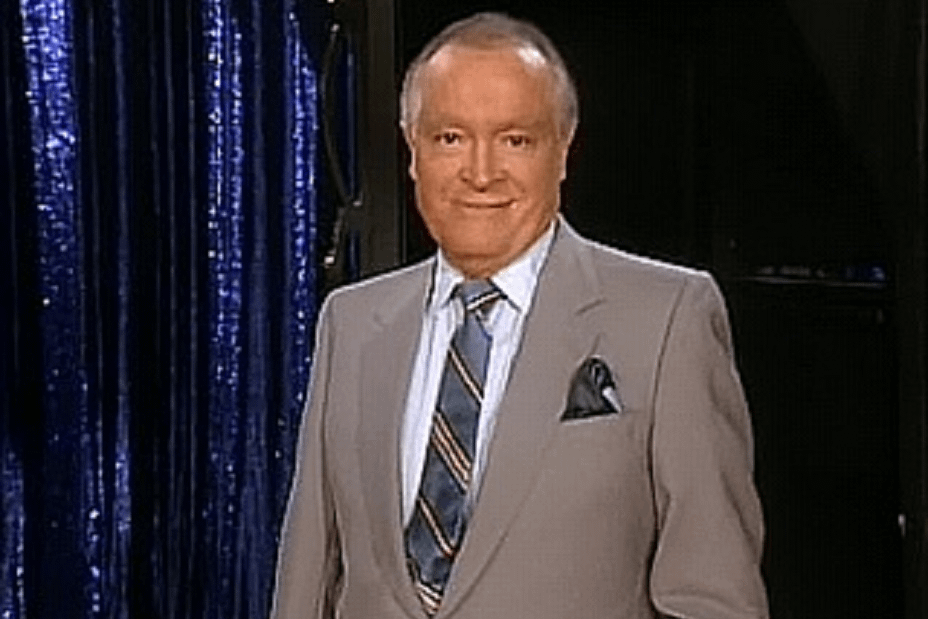
Ultimately, Bob Hope’s legacy rests on a profound contradiction. He was the nation’s beloved, patriotic comic uncle, a tireless USO performer, a presidential confidant, and a symbol of stability. Simultaneously, he was a relentless womanizer, a control-obsessed mogul, and a man driven by a crippling fear of irrelevance. He was capable of immense generosity toward the troops and calculating cruelty toward those in his inner circle. His achievements are undeniable, but his humanity was deeply flawed. Hope’s final, longest-running performance was the maintenance of his own image, leaving behind a fascinating legacy that is a powerful blend of laughter, loyalty, and shadow.
Bob Hope passed away at the impressive age of 100, leaving behind a career that literally spanned the entire 20th century. His legacy is complicated, but the laughter and goodwill he generated, especially for the men and women in uniform, will always be his defining feature. His life proves that behind every major public figure, there’s a highly complex, carefully managed private human being.
This story Bob Hope’s Secret Life: Patriot on Stage, Playboy Off It was first published on Daily FETCH


